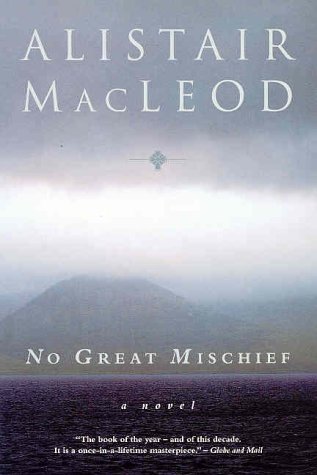Reviewed by brokentune on
This, in short, is what I liked about the book. Yes, I do mean that particular quote.
I know this is one of those books that a lot of people seem to really like, and I can understand why, but for me this was a frustrating and really annoying read. To the extent that I even got annoyed with things I would not usually pay much attention to, like "Why is the guy's Gaelic name spelled in two different ways?".
To paraphrase the author himself:
"She could not help it, I suppose. Sometimes it is hard to choose or not to choose those things which bother us at the most inappropriate of times."
Anyway, No Great Mischief tells the stories of a family from when they first left Scotland for Canada in 1779 up to late 1970s/1980s (it's not really clear). There are plenty of colourful characters, plenty of stories of hardship, and an abundance of nostalgic references to Scotland - or rather one single event in Scottish history. For the most part, the references were limited to the Battle of Culloden and the Jacobite Uprising (around 1745/46).
And this, together with the nostalgia for anything Gaelic just really got on my nerves rather quickly.
Don't get me wrong I have rather a soft spot for Gaelic and I delight in watching BBC Alba sometimes just to hear it while reading the subtitles, but we're talking about a story relying on a few overused phrases and pretending as if everyone with the last name of MacDonald is fluent in it.
As for the Jacobite Uprising...Really, there is more to Scottish history and not everything that happened to the MacDonalds of Cape Breton in the 20th century can be blamed on or explained by a reference to an event in 1745/46.
Let me illustrate...
One of the MacDonald's relatives living in California is being drafted to fight in the Vietnam War and his parents send him to the branch of the family in Cape Breton to escape the draft. And the discussion is as follows:
" ‘From what I understand of this war,’ he continued, ‘those people are only fighting for their own country and their own way of being. It’s hard to say they should be killed for that.’
‘I know,’ I said. ‘Wars touch all of us in different ways. I suppose we have been influenced by lots of wars ourselves. We are probably what we are because of the ’45. We are, ourselves , directly or indirectly the children of Culloden Moor, and what happened in its aftermath.’
‘Yes,’ he said with a smile, ‘the old men at home, the seanaichies, always used to say, “If only the ships had come from France …”
’‘Maybe,’ I said. ‘We’ll never know. Perhaps it was all questionable from the start. Talking about history is not like living it, I guess. Some people have more choice than others.’ "
Aha, yup. Culloden. Of course. Everything can be traced back to Culloden. No mention of the Union of Crowns, the bribery surrounding the Darien scheme, and the resulting Act of Union. Or why not go back further to the wars of Scottish independence?
Incidentally, I do get that part of the book's message is how people might be held back by living in the past - or as MacLeod puts it:
" ‘Living in the past is not living up to our potential.’ "
It's just that this message - conveyed as a joke - is rather muddled by a lot sentimental illusion.
Reading updates
- Started reading
- 23 November, 2014: Finished reading
- 23 November, 2014: Reviewed
